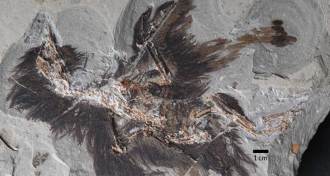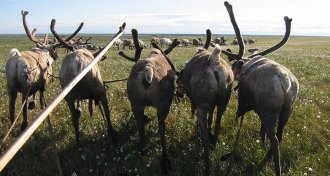News in Brief
-
 Health & Medicine
Health & MedicineOld blood carries risks for brain
Young blood may not save the brain, by one measure at least.
-
 Archaeology
ArchaeologyFor some early monks, impaired hearing amplified sounds of silence
Middle-ear ailments probably had little impact on early Christian monks’ lives.
By Bruce Bower -
 Paleontology
PaleontologyCretaceous bird find holds new color clue
New molecular clues in 130-million-year-old bird fossil could help paleontologists firm up case for ancient color in dinosaurs.
By Meghan Rosen -
 Health & Medicine
Health & MedicineHeartburn drugs may raise stroke risk
Drugs used by millions for heartburn linked to increased risk of stroke.
By Laura Beil -
 Neuroscience
NeuroscienceDespite Alzheimer’s plaques, some seniors remain mentally sharp
Plaques and tangles riddle the brains of some very old and very healthy people.
-
 Health & Medicine
Health & MedicineDownside of yo-yo dieting is rise in heart disease risk
Yo-yo dieting hurts the heart, even if you’re not overweight.
By Laura Beil -
 Animals
AnimalsSkimpy sea ice linked to reindeer starvation on land
Unseasonably scant sea ice may feed rain storms inland that lead to ice catastrophes that kill Yamal reindeer and threaten herders’ way of life.
By Susan Milius -
 Neuroscience
NeuroscienceInfant brains have powerful reactions to fear
Babies can recognize facial emotions, especially fear, as early as 5 months old.
-
 Health & Medicine
Health & MedicineMarijuana use weakens heart muscle
Marijuana linked to dangerous heart stress.
By Laura Beil -
 Neuroscience
NeuroscienceZap to the head leads to fat loss
Stimulating the vestibular nerve led people to shed fat in a small trial.
-
 Animals
AnimalsNarwhals are really, really good at echolocation
Audio recordings from the Arctic suggest that narwhals take directional sonar to the extreme.
-
 Environment
EnvironmentOcean plastic emits chemical that may trick seabirds into eating trash
Some seabirds might be eating plastic because it emits a chemical that smells like food.